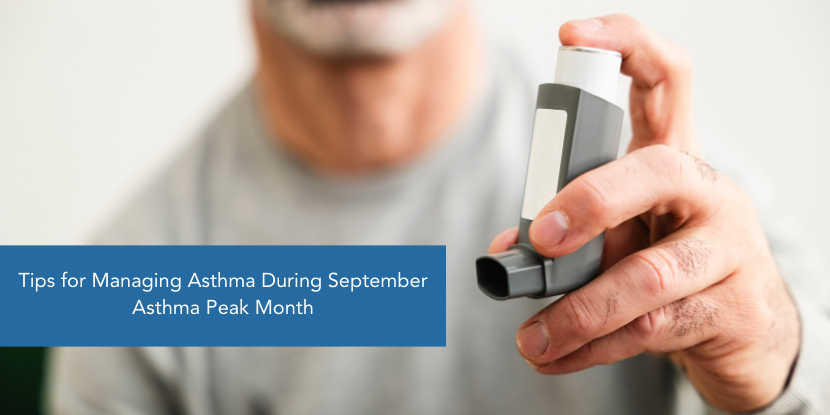Tips for Managing Asthma During September Asthma Peak Month
- Category: Healthy Living
- Posted On:
Asthma is a chronic lung condition that makes breathing difficult due to the narrowing of airways, often causing wheezing, shortness of breath, chest tightness, and cough. While it can affect people of all ages, it often begins in childhood and is closely tied to allergies and other respiratory infections.
Every year, September is known as Asthma Peak Month, a time when asthma attacks, emergency care visits, and hospital stays spike more than any other month. These episodes typically reach their highest point during the third week of September.
Why does this time of year have a heightened risk for asthma episodes? September is when exposure to allergy and asthma triggers, such as ragweed pollen, indoor and outdoor mold, and seasonal respiratory viruses, are at an all-time high. For children, returning to school often means exposure to germs and poor air quality, and follows inconsistent medication use over the summer, making asthma harder to control. It’s estimated that approximately 25% of all childhood asthma hospitalizations occur in September, according to the Allergy and Asthma Network.
It’s important to understand how to manage your asthma and know what to do if you have an asthma attack.
Is Your Asthma Under Control?
The American Lung Association notes that asthma is considered well controlled if:
- You use your quick relief inhaler fewer than 3 times per week.
- You do not wake up with asthma symptoms during the night.
- You can exercise and participate in daily activities with no or few asthma symptoms.
Even if your asthma feels controlled, taking extra precautions to protect yourself this peak season can help decrease the risk of an asthma attack.
Steps to Stay Healthy this Asthma Season
1. Schedule an Asthma Checkup
Scheduling an appointment with your primary care provider or asthma specialist now can help you get ahead of peak season. Talk with your doctor about current symptoms, medications, how to use an inhaler, and triggers, and review your asthma action plan.
Many people with asthma tend to stop taking their medication during the summer months, so now is the perfect time to refill your prescriptions and start taking them again.
2. Limit Exposure to Triggers
If you’re sensitive to ragweed, mold, or other allergens, small changes can make a big difference. During peak pollen times, minimize being outdoors, keep windows closed, shower and change clothes after being outside, and consider wearing a mask when outside. Use forecast tools to track daily pollen count and pay attention to weather conditions in your area. Reducing exposure helps prevent asthma attacks before they start, so you can stay active and comfortable.
3. Create an Asthma Friendly Environment
Since we spend about 90% of our time indoors, improving indoor air quality (IAQ) is key:
- Use HEPA filters for central heating and portable air cleaners.
- Maintain humidity levels between 30-50% to prevent mold and dust mites.
- Choose unscented cleaning products instead of strong-smelling sprays, candles, or perfumes.
- Clean regularly: remove shoes at the door, vacuum carpets weekly, and wash bedding in hot water.
Talk to your child’s school or your workplace about the steps they’re taking to improve indoor air quality. A healthier indoor environment reduces daily triggers.
4. Get Vaccinated
Respiratory infections like Flu, Covid-19, and RSV (Respiratory Syncytial Virus) can be more serious for people with asthma and can even lead to pneumonia and asthma attacks. The CDC recommends that people with asthma should be vaccinated for respiratory diseases as soon as vaccines become available. Vaccinations can give your lungs extra protection to lower your risk of an asthma attack, helping to prevent hospitalization and keeping you healthier during peak season.
Schedule your annual vaccines with your primary care provider and remember that it takes two weeks after vaccination for protection to build.
Aside from vaccinations, take proper precautions to protect yourself from getting sick—wash your hands frequently, avoid touching your eyes, mouth, and nose, and cover your cough and sneeze.
5. Focus on Overall Health
With the heightened risk of asthma and the upcoming flu season, it’s important to stay mindful of your health. Getting a good night’s sleep, drinking enough water, eating a balanced diet, and exercising can help improve your immune system and prevent you from getting sick.
6. Consider a Pulmonary Rehabilitation Program
If your asthma symptoms become severe, hard to manage, or it’s affecting your daily life, it may be time to consider enrolling in a Pulmonary Rehabilitation Program.
“When patients are equipped with the skills for correct inhaler use, are provided with tailored rehabilitation programs, and are actively engaged in their treatment plans, we see meaningful improvement in respiratory function and quality of life.” says Dr. Lev Agarunov, with Frederick Health Medical Group Pulmonary Medicine, triple board-certified in Pulmonary Disease, Critical Care Medicine, and Internal Medicine.
Frederick Health’s Pulmonary Rehab Program helps patients with asthma and other chronic lung diseases like COPD breathe easier and live better. We combine personalized exercise with education and support to build stamina, strengthen muscles, and boost endurance. Our program is tailored specifically to patients’ needs with a focus on breathing techniques, energy conservation, and asthma specific education to help control symptoms and improve quality of life.
Take the First Step
Don’t wait for your symptoms to get worse. Take control now and breathe easier. Schedule an appointment with a Frederick Health Primary Care provider by visiting frederickhealth.org/FindAProvider or call 240-215-6310.
